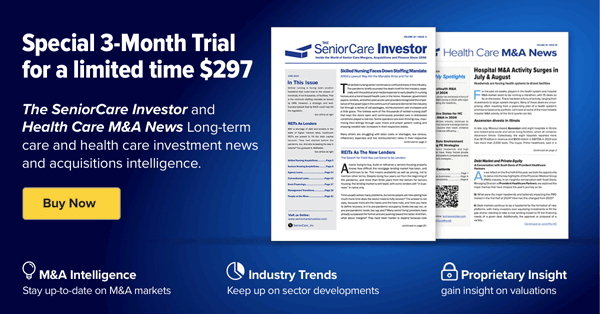Activity in the healthcare industry slowed down in October 2024, but an increase in certain sectors has left investors feeling hopeful for the coming months. In October 2024, 144 healthcare transactions were reported, a notable decrease from both October 2023, when 189 deals were announced, and September 2024, when 161 deals were reported. It is important to note that these numbers are preliminary findings for the month, and more deals may be added to the statistics as companies continue to announce transactions.
The most active sector in October was Other Services with 44 transactions, or approximately 31% of the announced healthcare deals. This is virtually the same as October 2023 when 46 Other Services transactions were reported as well as September 2023 when 47 deals were announced.
The most active Other Services subsector in October 2024 was medical outpatient buildings (MOB) with 25 transactions, a 56% increase from October 2023. Montecito Medical Real Estate was the most active buyer. Its three deals spanned Texas, Alabama and Georgia and totaled more than 47,000 square feet. In October 2023, Montecito also completed three acquisitions, purchasing a total of nine buildings in South Carolina, Minnesota and Arizona.
Activity in the Physician Medical Groups sector reached 28 deals in October, a 10% decline compared with year-over-year results. However, the market remains a top destination for investors, accounting for nearly 20% of all activity in October. There were no PMG buyers that completed multiple acquisitions in the month, but some of the buyers that did announce transactions include Beyond Podiatry, Imagen Dental Partners and Schweiger Dermatology Group.
Dental practices remain popular targets for investors, with nine transactions in October, which is a slight year-over-year decrease from the 12 announced in October 2023. Of those nine deals, seven of them were completed by dental service organization buyers, which have had a continuously large presence in the PMG space for the past year. The two other most active specialties in the PMG space are dermatology and internal medicine with three acquisitions each.
The only transaction in the PMG space to have a disclosed price was University of Iowa Health Care’s (UIHC) acquisition of Mission Cancer + Blood, a 24-physician oncology practice, for $280 million.
Once the transaction is completed, Mission Cancer + Blood will continue to operate its 21 clinics, with the added benefits of UIHC’s resources and its National Cancer Institute-designated cancer center.
Other sectors with notable activity include eHealth (18 deals), Laboratories, MRI and Dialysis (seven deals) and Biotechnology & Pharmaceutical (12 deals).
Disclosed spending in October totaled more than $5.18 billion across 23 transactions, with two transactions totaling more than $1 billion. This is a significant decrease from October 2023, when disclosed spending totaled more than $28 billion across 35 deals.
The largest purchase price was H. Lundbeck A/S’ acquisition of Longboard Pharmaceuticals for $2.6 billion. Longboard is a clinical-stage biopharmaceutical company that develops novel, transformative medicines for neurological diseases.
H. Lundbeck A/S, a specialty pharmaceutical company, researches, develops and sells pharmaceuticals for the treatment of brain disorders on the basis of in-house research in Europe, the United States and internationally. According to its full-year financial report, the company reported more than $2.925 billion (DKK 20 billion) in revenue.
The other significant transaction was AbbVie Inc.’s acquisition of Aliada Therapeutics for $1.4 billion.
Aliada Therapeutics is a biotechnology company that addresses delivery challenges in central nervous system drug development. Aliada’s lead investigational asset utilizing this delivery technology, ALIA-1758, is an anti-pyroglutamate amyloid beta (3pE-Aβ) antibody in development for treating Alzheimer’s disease.
AbbVie is a biopharmaceutical company that discovers, develops, manufactures and sells pharmaceutical products worldwide. According to its full-year 2023 financial results, the company delivered net revenues of $54.3 billion and EBITDA of $21.5 billion.
Private equity, as expected, represented a large portion of the acquirers in October. Private equity groups (and their portfolio companies) accounted for 43% of the healthcare transactions, or a little more than 30%. This is an increase from October 2023 when private equity groups accounted for nearly 37% of the buyers in the healthcare space.
Some of the active private equity firms include TPG Capital, Bain Capital and InTandem Capital Partners.
OneOncology Inc., backed by TPG Capital and AmerisourceBergen, acquired Southeastern Medical Center, a five-physician oncology practice based in North Carolina. TPG’s WellSky also acquired Bonafide, an enterprise software solution for durable medical equipment and home medical equipment companies.
Bain Capital’s portfolio company, Surgery Partners, Inc., completed the acquisition of nine orthopedic practices, adding more than 35 physicians to its network. Bain Capital, alongside Evergreen Medical Properties, also purchased a medical outpatient building in the Greater Portland area. The price was not disclosed.
Election uncertainty remains a critical factor for the healthcare M&A landscape. Many investors may be holding out on completing acquisitions as they wait to see who wins next week’s presidential election.
“According to S&P Global Market Intelligence data, transaction activity often declines after an election,” said Matt Bisturis, a shareholder at Schwabe, in a September 2024 article. “In four of the seven election cycles prior to 2016, U.S. mergers and acquisitions saw double-digit percentage declines in deal value from the post-election-day period to year’s end, compared to transactions that occurred between Labor Day and election day.”
Bisturis continued to say that elections influence M&A by impacting inflation, interest rates, taxes, and geopolitical conflicts, creating uncertainty for investors. Regulatory review is a key area of concern, with recent governmental challenges affecting sectors like healthcare. Kamala Harris has proposed heightened regulatory scrutiny, reflecting the Biden administration’s antitrust priorities. In contrast, Trump would likely reduce regulatory focus, particularly on private equity.
However, a September 2024 article written by Michael Barbella for Medical Product Outsourcing offered a more neutral perspective for the election, tending to believe that M&A will not be impacted to a great degree.
“Regardless of the winner, the election will not have a negative impact on medtech M&A. If anything, there may be some positive effects for late 2024/early 2025 (from tax policy, mainly),” said Barbella.
He then went on to note that the factors that fuel healthcare M&A (such as an aging population, technological advancements and increased competition) will not automatically disappear after the election. So, there’s reason to remain hopeful that activity will remain stable.
While healthcare activity did decrease in year-over-year comparisons, there’s no immediate cause for concern as the market remains robust.


